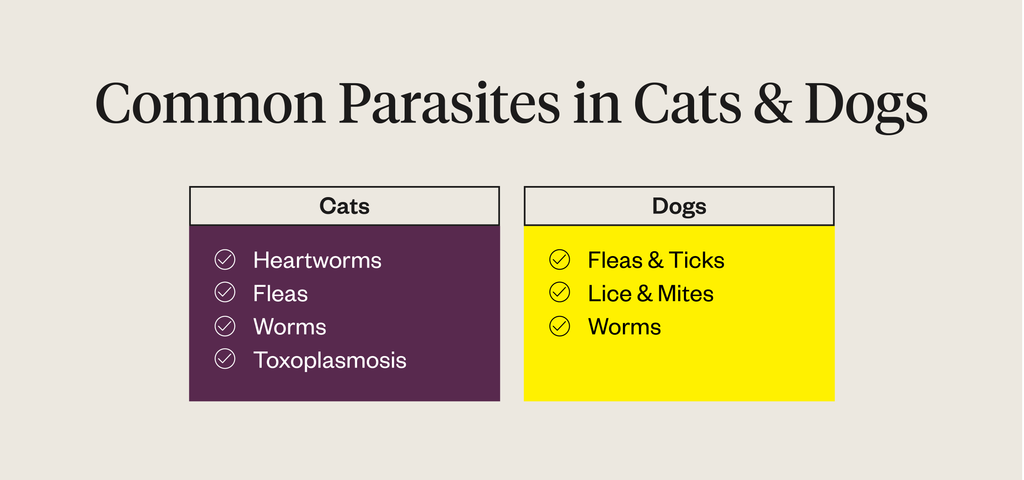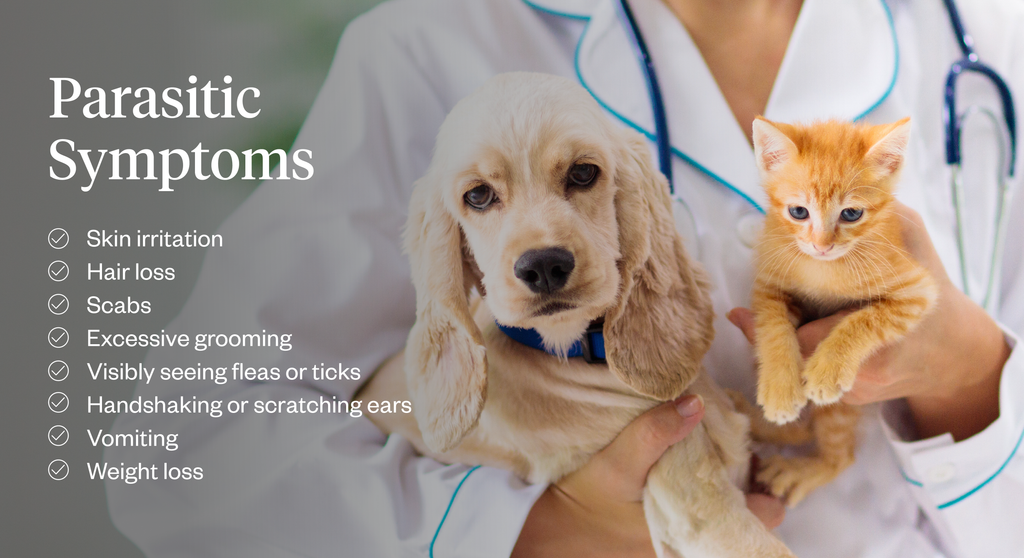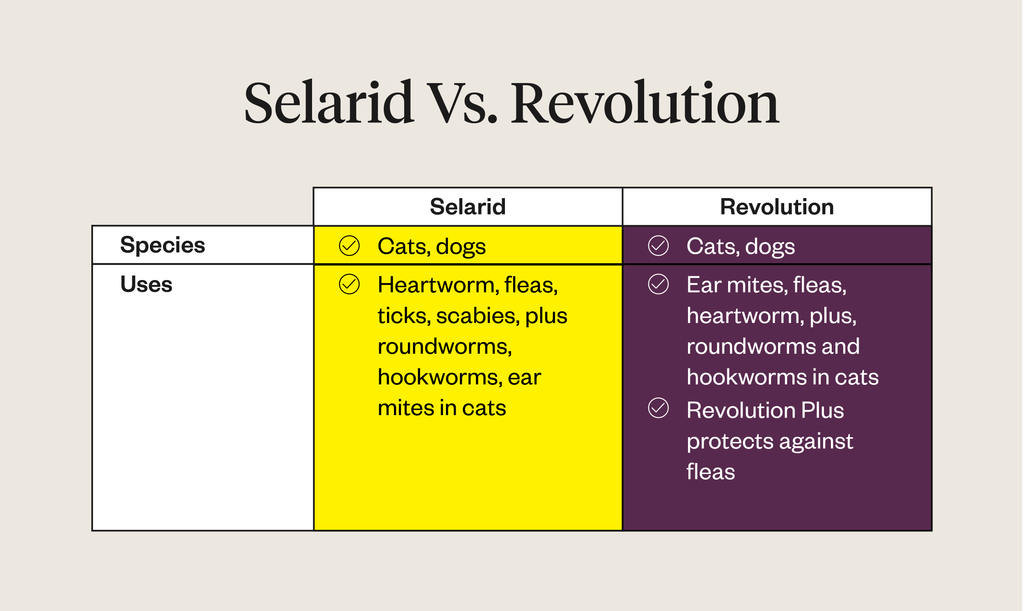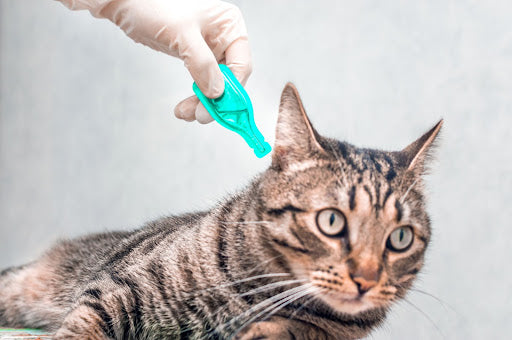12 Min Read
Selarid Vs. Revolution
Key takeaway

Why pet owners are switching to online vet care with Dutch
-
Prescriptions delivered free to you
-
Fast access to Licensed Vets over video
-
Unlimited video visits and follow-ups
As a pet parent, you want to make sure your cat or dog lives a healthy and happy life. Part of that responsibility involves protecting them from parasites so they can enjoy their life to the fullest. Luckily, plenty of options are available, and with a bit of guidance, you can choose the proper protection for your beloved furry companion. Let's take a look at two excellent choices that offer flea and tick protection for your pet: Selarid and Revolution.
- Parasite Treatment For Cats & Dogs
- What Is Selarid?
- What Is Revolution?
- Comparing Selarid Vs. Revolution
- FAQs
- Final Notes
Parasite Treatment For Cats & Dogs
Ensuring proper parasite prevention and treatment is essential for effectively caring for your pet, as it plays a pivotal role in safeguarding their health and overall well-being.
Internal parasites, like heartworms, roundworms, hookworms, and tapeworms, can cause severe health issues ranging from digestive problems and malnutrition to respiratory distress and even heart failure in the case of heartworm disease. Many of these parasites are zoonotic, meaning they can be transmitted from animals to humans, posing a significant health risk. Regular deworming and heartworm prevention are essential parts of maintaining your pet's health, as these parasites can often be present without any immediate, noticeable symptoms.
External parasites, such as fleas and ticks, not only cause discomfort and irritation but can also transmit a host of diseases. For instance, fleas can transmit bubonic plague and murine typhus to humans, while ticks can spread Lyme disease, Rocky Mountain spotted fever and other serious illnesses. Furthermore, some pests, like fleas, can infest your home, creating additional challenges. Prevention of these external parasites typically involves topical treatments, oral medications, or collars that repel or kill these pests. Ensuring that your pets are protected against these threats is a critical part of responsible pet ownership, not only for the health of your pets but also for the safety and comfort of your entire household.

Common Parasites In Cats & Dogs
When it comes to cats, being informed about the four main types of cat parasites is crucial, as it allows you to take proactive measures to protect your beloved feline companion. These parasites are outlined below:
- Heartworms: Chances are, you've heard of this parasite, but you might not have been aware that it can affect not only your dog but also your cat. In fact, the heartworm parasite can pass to your cat if it is bitten by a mosquito that is infected. While there are some ways to cut down on exposure to some parasites, when it comes to this one, it can be very hard as mosquitos can be right inside your home, creating a risk even if your cat is inside 100% of the time.
- Fleas: This type of parasite is in the ectoparasite category. It means they live on the outside of an animal (or other host) instead of getting inside the body. In cats, in particular, fleas are the most common parasite they experience. This is because they can come into contact with fleas virtually anywhere. Ticks are another type of ectoparasite and can affect cats that spend time outside.
- Worms: More formally called gastrointestinal parasites, types of worm parasites that can either live on the inside or outside of your pet include flukes, tapeworms, hookworms, and roundworms. Roundworms are the most common type you will experience in a cat, and it's important to note that humans can also get infected. Tapeworms are also found commonly in a cat's intestines.
- Toxoplasmosis: This is a common type of parasite that infects a cat when they consume an infected rodent. It can be difficult to know it's present as it often doesn't cause any symptoms. This can also be transferred to a human, most often through the human having direct contact with feline feces.
Now that we have looked at what you should be aware of in terms of parasites and cats, let's explore the same information for dogs. Here are the most common types of parasites you will find in dogs:
- Fleas & Ticks: The two main types of parasites that dogs deal with are fleas and ticks. When it comes to ticks, worldwide, there are over 800 species, and they have four stages of life. Therefore, they can become a real problem since dogs do have to go outside a great deal more than their feline counterparts. Fleas can be even more challenging to fight as they are tiny insects that feed on your pet and can cause your dog to scratch itself, which can lead to a skin infection.
- Lice & Mites: Another common parasite that you need to know about when preventing infestation in your dog are lice and mites. They are microscopic, so they can be difficult to diagnose. Lice that are alive can be treated via tick or flea treatment. Mites can cause an infestation and result in mange.
- Worms: Dogs are also susceptible to worms, including whipworms, roundworms, hookworms, heartworms, and tapeworms. These can grow and then thrive in the intestinal tract, or in the case of heartworms, in the lungs and heart. Worms can be more than a nuisance, as a significant case can lead to complications and even threaten a dog's life. Roundworms are actually the most common type of worm a dog can get, and many puppies are even born with them.

Symptoms
As you might expect, the symptoms of a parasitic condition will vary depending on the specific type you are dealing with. Therefore, the following are some general symptoms to consider, but please note that they may not encompass every condition mentioned:
- Skin irritation
- Hair loss
- Scabs
- Excessive grooming
- Visibly seeing fleas or ticks
- Head shaking or scratching ears
- Vomiting
- Weight loss
Causes
The way your pet contracts parasites can vary. For instance, fleas are ubiquitous and can be found almost everywhere. Pets that spend more time outdoors are more susceptible to flea infestations, as well as tick bites.
Heartworms, on the other hand, are acquired through mosquito bites, which means virtually any pet can be affected, even those spending most of their time indoors, as they may occasionally be exposed to a mosquito bite.
Intestinal parasites, like various types of worms, are typically contracted when animals consume something they shouldn't, such as contaminated feces or other sources. While it's nearly impossible to shield your pet from every potential threat, attempting to do so would be impractical. Therefore, the key focus should be on prevention rather than attempting to avoid every risk. Understanding how to treat these conditions is essential, but prevention is often the most effective approach.
Treatment
As previously mentioned, the best approach is to prevent parasites in cats and dogs in the first place. Providing preventive treatments such as Selarid or Revolution to your pets can significantly reduce the likelihood of them experiencing these issues. Opting for preventive measures is the ideal way to safeguard your pets' health and well-being.
What is Selarid?
Selarid is a comprehensive year-round prescription protection for dogs and cats against heartworm disease and fleas, regardless of breed and size. It offers monthly topical applications that effectively safeguard your pets. In addition to its efficacy against fleas, Selarid also treats ticks in both dogs and cats. It protects cats against roundworms, hookworms, and ear mites, and dogs from scabies or sarcoptic mange.1
One of the key benefits of Selarid is its ability to break the flea life cycle, which prevents flea eggs from hatching, effectively controlling flea infestations. Furthermore, it disrupts the life cycle of heartworms, offering reliable prevention against this serious health issue.1
It's essential to note that Selarid can be administered to cats as young as eight weeks old and dogs from six weeks of age, making it suitable for a wide range of pets. With its broad spectrum of protection and user-friendly topical application, Selarid is a valuable solution for maintaining the health and well-being of your beloved furry companions throughout the year.1
What is Revolution?
Revolution is renowned as one of the most versatile topical products, providing a comprehensive shield against a wide range of external and internal parasites for both dogs and cats. This highly effective solution protects pets from common issues like ear mites, fleas, and heartworm disease.2
For cats, Revolution goes beyond these benefits by also treating roundworms and hookworms, making it a comprehensive solution for feline health. It is crucial to note that Revolution requires a prescription from a veterinarian or a qualified medical professional to ensure proper usage and safety.2
Cats can begin treatment at eight weeks or older, while dogs can safely start at six weeks. For those seeking even more advanced protection, there is Revolution Plus, a variation of this medication that contains the additional active ingredient sarolaner. Revolution Plus provides enhanced protection against ticks, making it an excellent choice for pet owners where ticks pose a significant threat.2
With its broad-spectrum effectiveness and various options available, Revolution is a trusted and reliable choice for parasite prevention.

Comparing Selarid Vs. Revolution
Selarid and Revolution are effective topical products for preventing and treating parasites in dogs and cats.
Selarid provides comprehensive year-round protection against heartworm disease, fleas, ticks, and more, including scabies protection for dogs. It also treats roundworms, hookworms, and ear mites in cats.
Revolution safeguards pets from ear mites, fleas, and heartworm disease, and it treats roundworms and hookworms in cats. Additionally, Revolution Plus, a variation of Revolution, includes an extra active ingredient for advanced tick protection. Both products require a prescription and have specific age requirements for treatment. Choosing between them depends on your pet's individual needs and your veterinarian's advice.
FAQs
Is selamectin the same as Selarid?
Yes, the active ingredient in Revolution is called selamectin.
What is the generic name for Revolution?
Selarid or selamectin is the generic version of Revolution.
Are there alternatives to Selarid and Revolution?
Yes, although both Revolution and Selarid are good medications for preventing parasites in your pets, there are other options you can consider. Bravecto and Vectra offer other topical treatments, while Seresto makes a collar for cats and dogs.

Final Notes
Selecting the appropriate regular topical preventative treatment is crucial for your pet's well-being. Consistent use of the proper treatment shields them from infections and serious diseases such as heartworms. Keeping your cats and dogs parasite-free enables them to live healthy and fulfilling lives. A little effort on your part goes a long way in safeguarding them from common parasite risks. Prioritize preventative care to invest in their overall health and happiness.
If you have any other questions about pet parasite prevention, don't hesitate to speak with a Dutch vet. You can easily schedule a video chat by signing up for a Dutch membership, answering a few questions, uploading pictures of your pet, and choosing a suitable time. Try Dutch today.
Share
References
-
"Selarid (selamectin)." Norbrook. https://www.norbrook.com/media/3085/selarid-product-detailer.pdf.
-
"Revolution (selamectin)." Zoetis Petcare. https://www.zoetispetcare.com/products/revolution.
